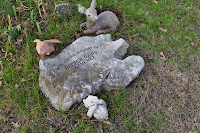And as you witness other families’ struggles and victories, you are sometimes privileged to see the human spirit at its best, inspired by, made strong by, and led by love.
But on occasion, doing so is almost more than you can bear.
Jerry and I met Hector and Ashley when our Kelly was in primary school and their Cristina was a toddler. They were much younger than we, but we clicked right away and discovered many things in common.
Hector and Ashley met and married at A&M and bleed maroon. Cristina was their first child, followed swiftly by two more little girls.
When we started Down Home Ranch, Hector and Ashley were among our earliest and most ardent supporters. Ashley served on the Board of Directors and the whole family fell out—and still does—for every event, big or small.
When they discovered that Ashley was pregnant with their fourth child, we rejoiced with them.
Things proceeded happily along, until one day I received a phone call in my office from Ashley.
“Judy,” she said. “Our family needs your prayers. There might be something the matter with the baby.”
She was in the fourth month, and a routine sonogram had picked up some disturbing information—the baby’s skeleton was not developing normally.
“Downs again?” I asked, but she said no, that it seemed to be something totally unrelated, maybe brittle bone disease or some kind of dwarfism or some combination of both. They would have to wait a while for more tests.
I asked her how she and Hector were doing, and she said okay. The baby was a boy. They’d found that out, too.
When I got off the phone I looked up brittle bone disease and my heart sank. Affected babies sustain massive fractures just from being born, and spend their lives in pain recuperating from one break after another. I couldn’t imagine Hector and Ashley and the girls having to witness their little one suffer so. I prayed hard for dwarfism. That was manageable, I thought. Sure, there would have to be lots of accommodations, but this family was used to that.
The rest of the pregnancy was filled with questions for which there were as yet no answers. The amniocentesis shed no light. Ominously, one of the possibilities mentioned was Osteogenesis Imperfecta Type 2, the most severe form of the brittle bone syndromes. If the baby had that, he would most surely die shortly after birth.
No one who knew Hector and Ashley doubted that they would continue the pregnancy, whatever the outcome. Even so, I still cannot imagine the courage it took, knowing there was a chance they would hold their baby for only a few minutes and then say goodbye.
But Hector and Ashley already knew that blessings come in all guises. This tiny boy, Hector David Sanchez was, and always would be, their son. They would keep him safe where he was for as long as they could, and hold him for his time on earth. He would know the love of his mother and father, his sisters and grandparents. They would place his future in God’s hands, as in truth, all parents must.
Ashley opted for a caesarean despite the fact that she’d had no trouble delivering the girls. She wanted to spare the baby the trauma of natural birth.
Hector David was born July 20 2001. It was immediately obvious that he would not live long.
The family took turns holding and loving him. He was baptized by their parish priest, and after 45 minutes, his little life ended.
When Ashley recovered from the surgery, baby Hector David was brought to Down Home Ranch, and his ashes buried in Sara's Garden under a large cedar elm, where a white river rock marks the space.
Hector and Ashley visit the spot during their many volunteering stints, and when Christine—now a lively, lovely teenager—arrives and departs from summer camp.
The Sanchez clan remains a happy, healthy family of six, from which one has departed, leaving behind a legacy of great love.
And life goes on.

